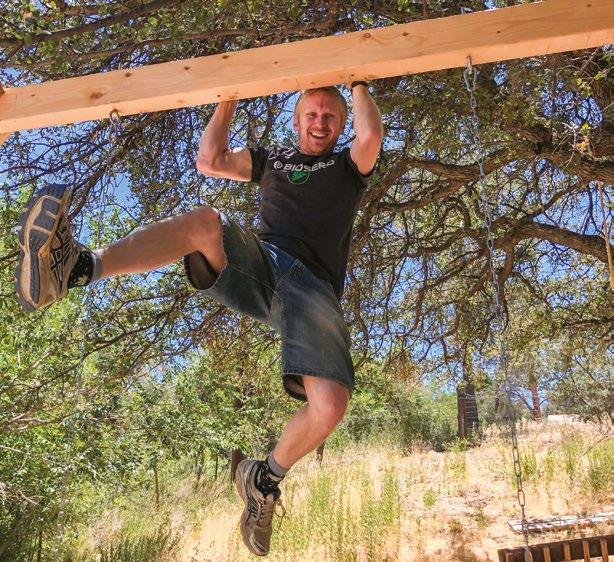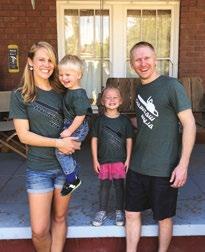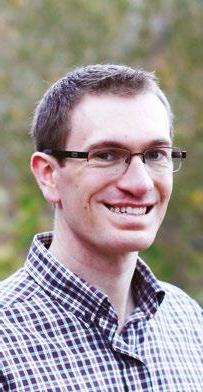
10 minute read
A Tale of Two Remote Workers
By Zara Glidden
Big Tech. Small Town.
The face of technology in Northern Arizona is constantly evolving. Each year, we see new businesses and opportunities that were once only available in larger cities moving into the region. This is thanks in part to a diverse, growing group of talented remote workers who are changing the way the world thinks about media and technology.
The option of working remotely for larger companies has become more and more common. And, with that option available, more tech professionals are choosing to live and work in smaller communities. What may be surprising is just how diverse the kinds of tech sector jobs these professionals are doing.
For software programmer Corey McCoy and animator/designer Aaron Lambert, the option to work remotely created the opportunity to choose life away from the big city. Both wanted to continue working in their high-paying jobs, but still be able to live in a community that offered the lifestyle they desired. It turned out that Northern Arizona fit the bill.
Corey McCoy
Remote Software Programmer and Part-Time Ninja

Photos courtesy of Corey McCoy
When most people think of technology jobs, they picture things like a Silicon Valley tech company or a Hollywood version of a super-secret high-security lab. Or maybe visions of a Google office, complete with a slide for employees to slide into meetings and communal nap pods, come to mind. While dated tech stereotypes are fun, the reality is that tech jobs are no longer confined to urban hubs. Northern Arizona has long been home to tech workers who make their mark from a distance.
For the past eight years, Corey McCoy has called Prescott, AZ home while working as a software developer for Biosero, an international biotech company based in San Diego. An Oroville, California native, McCoy has an eclectic history. His past roles have included professional tree trimmer, flight instructor, and competitor on the kingsize obstacle course of NBC’s American Ninja Warrior.
Biosero specializes in lab robotics that accelerate medical research. “Our programs enable scientists to make better decisions, in less time, with more data,” McCoy says. “Basically, we control the robots that do the research.” He is the lead developer on Biosero’s flagship product, Green Button Go, a lab automation “scheduler”. Passionate about how this tool helps labs perform better, he makes it clear that the product is much more than just a calendar.
Green Button Go comes into play whenever researchers are up against serious practical obstacles. “When a scientist has a theory about how to treat or cure a particular disease, and of a molecule that might make a good drug, they need to mix sometimes a million different chemical permutations,” he explains. This means performing one million tiny experiments. “With robotics, instead of just moving plates around, the scientist can spend their time doing something more useful.” The data is better and leads to quicker, higher-quality solutions.
In 2020, the need for timely medical research has never been more important. Biosero is offering free software and support to labs working on COVID-19. This is deeply encouraging for McCoy. “Now I see where all those difficult hours spent in my home office, which can get lonely, are impacting the real world in a time of need and crisis. What a blessing to get to live in rural Northern Arizona, work from home where I’m near my wife and kids, and still get to impact the world in such a way.”
McCoy and his wife Kristen were living in Phoenix when he joined Biosero’s team, but they have always had an affinity for mountains, wilderness, and small-town life. Kristen grew up spending summers with her family at Camp Pinerock, and Prescott reminded McCoy of his hometown in the Sierra foothills. When his job gave him the chance to relocate, the choice was easy.
“We prayed that we would somehow find a quiet, rural spot where we could have our hobbies, build big obstacle courses, and give our kids the kind of runaround room that we want for them. And at the same time, we want to be close to community events and amenities. We’ve got that here,” said McCoy.
Remote work comes with its own special set of challenges and McCoy freely admits that his job calls for self-discipline. It can be challenging to see the results of the work he puts in from the home office. But when the going gets tough, McCoy has his one-acre yard near downtown Prescott to escape into.

A decade of replacing water cooler breaks with ninja workouts paid off. McCoy worked his way onto American Ninja Warrior’s 2019 season, competing in both the LA Qualifiers and City Finals. Pursuing this passion (which began during his years in the tree trimming business) is possible in part because of his remote worker status at Biosero. He plans to continue to apply and compete in future years.
In Northern Arizona, the McCoys have built strong local ties, a rich community of friends and church family, and a delightfully treacherous backyard ninja gym. Staying connected with his coworkers across the world can be tricky, but good strategies help close the distance. Video calls in particular make communication feel more personal. McCoy noted that when working with a colleague in Germany on a robotics setup in France, their conversation was as easy as if they had been working side-by-side.
While McCoy and his career are anything but average, he believes that carving out a lifestyle like his own is more possible than people might think. Not every job can or should be remote, but there are more and more options in the tech universe for those who are ready to invest their time and talents.
“My role in my company is a large one, and I can do it very, very well from Prescott,” he said. “I feel so incredibly blessed to live just minutes from downtown, where you’ve got this incredible community feel. I get to choose to live here and yet still impact the world through biotechnology. How cool.”
Aaron Lambert
Animator and Designer

Aaron Lambert is a designer who creates motion capture graphics for movies and video games. Motion capture, or “mo-cap,” involves filming human actors with sensors placed all over the actor’s body. These sensors track and record their movements, which are then mapped on a computer. Lambert’s job is to then use these mo-cap images to create animated characters. Anyone who has played a realistic video game or watched a superhero movie has seen mo-cap in action, but most viewers are too busy enjoying the game or movie to think much about how those characters are brought to life by digital artists like Lambert.
Born and raised in San Diego, Lambert has loved design and video games from an early age. “I was always into video games, even when I was young,” he says. “One of the big things that really got me into thinking of it as a potential job was a game I enjoyed called Thief. It’s pretty old – I think it came out in ’98 – and anyone can use it to make their own missions and play them. A lot of people actually created missions that were even better than the original game.”
This interactive community helped Lambert see video games as more than just something to enjoy as a player. He studied animation at the Art Institute of California in San Diego and interned at Sony Computer Entertainment. After a year of contract work, he moved to Los Angeles and landed a job at House of Moves. “It’s funny, it was supposed to be a six-month job and now it’s been 13 or so years,” he laughed. As Lambert grew into his current position, he’s had the opportunity to take on many different roles.
Lambert currently lives in Prescott, Arizona, working as Lead Animator for the Los Angeles-based motion capture studio, House of Moves. Skilled in animation, graphic and video game design, video editing, special effects, and writing, Lambert has worked on hundreds of video games, movies, commercials, phone apps, and an animated YouTube channel. You can see some of his work in video games like Call of Duty, Mortal Kombat, and Resident Evil. He also worked on movies such as Invictus, Spiderman: Far from Home, The Ninja Turtles, and The Great Wall.

Lambert has worked on hundreds of video games, movies, commercials, phone apps, and an animated YouTube channel.

After he and his wife met and married in LA, they started dreaming of living somewhere with more breathing room and access to nature. Though Lambert enjoyed being near other creatives in his industry, he admits that the city was crowded, expensive, and a difficult place to raise a family.
Lambert’s creative flexibility and desire for a more rural life eventually led him to Arizona. With their second child on the way, he and his wife, who attended college at Embry-Riddle, decided to move to Prescott. The couple has family in the Quad Cities area of Arizona and had visited the area before, so they knew it would be a great fit for their growing family.
“It’s just a beautiful place with a lot of outdoor opportunities. We liked that there are seasons here - and that they aren’t too harsh. There are a lot of things that this community has that we appreciate,” Lambert explains.
Bringing his job with him, he took the plunge into remote work. It was a dicey decision, since there was no surefire guarantee the transition would be smooth. The studio had previously only had one remote employee.
“Another guy was in this program where you travel for a year, going to different countries each month. [The fact that] he could do that, where he had sketchy internet, and was still able to do his job, kind of convinced my lead and director that it could be done.”
Since then, he’s settled into the remote routine and gained a lot of perspective. “The commute is great, just a walk down the stairs,” he said. “I knew it’d be a challenge in that I needed to make sure I was staying social since I didn’t have a group of people I was going to be seeing every day at the workplace. I think I’ve done a pretty good job of that. I was very intentional from the beginning about not just being a homebody, because I know that I can be.”
- Aaron Lambert
Lambert and his team use services like Discord, Zoom, and Slack as well as industry-specific file sharing systems to stay in touch day-to-day. Surprisingly, the shutdowns due to the coronavirus pandemic have actually improved the company’s digital communication. “We always joked about how the animators just wouldn’t use those tools, but now everyone’s kind of having to,” he chuckles.
As the entire technology universe is being shocked into innovation, Lambert thinks that the door to remote work opportunities is opening wider. As he and his teammates work on new projects (including the forthcoming game Crucible) from their homes, they’ve sharpened their skills and opened their minds to what’s really possible. Design work, especially in the world of video games, requires collaboration. But for people who want to travel or live in a small town, there are new, interesting ways to make co-working successful.
Working remotely from Arizona has also given Lambert time to pursue several personal projects. Off-duty, he writes both fiction and nonfiction, and designs board games. Passionate about helping others achieve more and find purpose in their work, he’s published Done! Finish Your Creative Project in One Month, as well as other books and articles on creativity. Most recently, he’s created a series of games for families to play while spending more time at home. While he has a lot of personal and professional projects going at once, he admits that it keeps things fun.










